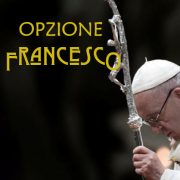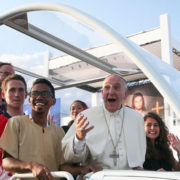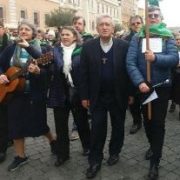
Fratelli tutti is certainly a provocative text that does not leave those who read it indifferent. It is easy to do a quick search on the internet to find so many different opinions regarding the thought of Pope Francis. Perhaps one of the fundamental reasons for the text is to “make people think” and to question the order of things and of our society; and the way we understand ourselves, to situate ourselves, to be in it…
I recognize that personally it has generated many questions for me, perhaps because of my social and cultural background which I find reflected in the words of the Pope when he denounces certain systems of “social policies being a policy for the poor, but never with the poor and never of the poor, much less part of a project that reunites people” (FT 169). Trying to leave aside the feeling – not always easy when the suffering of the people is taken into account – we will try to give some considerations of the encyclical in an anthropological and psychosocial key.
The question of the human good
It seems to be a question that is still valid, simply because there is no unanimous answer in our world. To provide it, it is necessary to adopt an anthropology from which the fundamental question is posed: how do we understand the human person? We see that in the current paradigm the conception of the individual is imposed on that of the person (FT 182). The dictionary of the Royal Spanish Academy defines the person as “an individual of the human species”.
However, the human person is fundamentally constituted by relationships, on which the secret of a true human life falls (FT 87). As a consequence of the personal relationship, social bodies and society emerge – interpersonal and social dimension – which in its own dynamism should be extended and enriched (FT 89), unfolding in a social friendship and in a fraternity open to all (FT 94). In this sense, the person -as a being in relation- has the possibility of developing his tendency to relationships that make possible the integral good of all.
The person, naturally open to relationships, discovers himself open to self-transcendence, that is, to a dynamic of openness and union outside of himself, towards others and ultimately towards God. In this sense we speak of a dynamism of relationship that marks and defines our own vocation (cf. FT 91). I take the liberty of interpreting this dynamism of self-transcendence proposed in the encyclical, using the term “conversions”, following Bernard Lonergan in his work “The Method in Theology”.
Lonergan speaks of three types of conversions: one of an intellectual type, which tends towards truth, in this sense we can recognize the inalienable human dignity (FT 111); one of a moral type which tends towards objective but limited values (FT 117); finally, a religious conversion (FT 127) which tends towards God and which allows for an open dialogue of horizons. In my opinion, it is only from this religious conversion that we can come to accept the effective love spoken of in the encyclical (FT 185). Certainly in this perspective of self-transcendence, we are called not to remain in a simple individual or social positivism, but rather to a theological positivism, as is the call to brotherhood. A fraternity that complements freedom and equality, and that orients them to love (cf. FT 103).
Human fragility as a commonplace
We discover in the encyclical a call to focus on human fragility. This is made clear in the first chapter when it speaks of “the shadows of a closed world” and of the evils that strike our society in general and people in particular. The trends of today’s world make it difficult to develop a universal brotherhood, which seems to have its deepest roots in human frailty. Such fragility is already evident in Gaudium et Spes 10 and is repeated in the encyclical: “it has to do with human weakness, the proclivity to selfishness that is part of what the Christian traditionreferes to as ‘concupiscence’: the human inclination to be concerned only with myself, my group, my own petty interest” (FT 166).
And it is this profound human reality that also puts us on a common plane, from which we can identify ourselves as fragile and limited, in which we can recognize in ourselves and in others our own limitation and our desire to overcome it. This common reality allows us to empathize and put ourselves in the place of the other to discover what is authentic, or at least understandable, in the midst of their motivations and interests (cf. FT 221).
The relationship and the social component
We have spoken at length about man in relation (FT 89), about the human person spontaneously open to relationship, and about the natural call to transcend oneself in the encounter with others (FT 111).
The human person finds limitations in himself but is always perceived as being open to overcome them. And in this network of relationships as a community, people, society, the search for integral human development (FT 112) is indispensable, which allows one to reach a moral height capable of transcending oneself and one’s culture of belonging (FT 117), creating a common identity (FT 158) that does not suppress the person by dissolving him or her in the masses, under the appearance of “we” which in the end is a “nobody”.
It is convenient to recognize our own rational human motivations (moral development), affective (affective development) and social (psychosocial development) that enter into the construction of a society. Only by knowing who we are and how we understand each other in the world can we be aware that we need each other. It is necessary to face the educational challenge to promote the culture of closeness and encounter (cf. FT 30; FT 216), and thus, to develop moral virtue and social attitude (cf. FT 114) because no one matures or reaches his fullness by isolating himself (FT 95).
The leadership Francis proposes
In the encyclical, one can see a vision of the Church from a social and socio-cultural perspective, already present in Gaudium et Spes “the Church in the world” and in Lumen Gentium “the Church as People of God”. The leadership proposed by the Pope is that which gives value to culture and which is born from and with the community. Some characteristics of the leadership paradigm that Francis had in mind are significant in this context.
He proposes a model of leadership that is capable of being “government of the people” (FT 157) and of fostering a common identity made up of social and cultural bonds (FT 158); and that does not fall into “immediacy” (FT 160) but is based on a lasting project of transformation and growth (FT 159). What is truly popular, says Francis, is to assure everyone the possibility of sprouting the seeds that God has placed in each one: his capacities, his initiative, his strength (FT 162). The leader must be a person concerned with the fragility of peoples and individuals. He must be a doer and builder with great objectives, with a broad outlook, realistic and pragmatic, even beyond his own country (Cf. FT 188).
If we have maintained that the encyclical leaves no one indifferent, it is necessary that we also ask ourselves sincere and unprejudiced questions:
- Is a society such as that proposed in the encyclical possible if we ourselves are so attached to our own interests and benefits?
- How can we not fall into a radicalization of ideas, if we try to rescue individuality with its motivations, values and needs, often ambiguous?
- How can we define ourselves as a real and concrete “we” without falling into the defense of an “abstract” collective?
- How do I define myself: as an individual/member of a group, or as a person essentially characterized by relationships of dedication to all?
Questions that help us to reflect on and deepen the encyclical. Hopefully, many more questions will arise from an attentive, meditated, and restful reading of an encyclical that is undoubtedly current and provocative.





